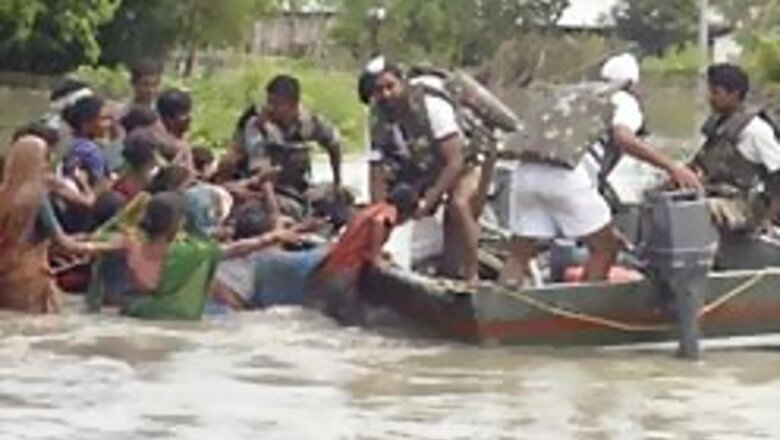
views
Patna: Setting an example of communal harmony in relief camps in flood-hit Bihar, Hindus are helping Muslims keep Ramadan fast by sharing their meagre resources.
"What is interesting to note that Hindus are helping Muslims to keep fast by providing whatever possible in relief camps," said Bihar Disaster Management Minister Nitish Mishra.
The majority of Muslims in relief camps were keeping fast while sharing everything with others.
It was reported that several NGOs have been providing food to Muslims keeping fast outside government control relief camps.
"People, mostly Hindus are arranging fruits, sweets and dinner for Muslims keeping fast outside relief camps," said Ranjeev, a social worker in Saharsa district.
It is for the first time in their life that Sakila Bano and Halim Ahmad, who were forced to leave their homes due to the Kosi river floods, are observing Ramadan fast under challenging conditions at their relief camps in Bihar.
They are two of the thousands of Muslims keeping fast during Ramadan that began on September 2 despite facing odds after becoming homeless by the turbulent Kosi river.
“For the first time, we have been left with no option but to keep the fast in the relief camp after getting displaced by Kosi river flood. It is an opportunity to show our faith in god," said Sakila Bano, in her 50s, a resident of a village in Araria district who has now taken shelter at a relief camp in Purnea district.
Halim Ahmad, in his 30s, a small time business man who has taken shelter at a relief camp in Saharsa district, admitted that keeping fast is difficult and challenging without proper arrangement of food, clean and hygienic environment to offer prayers.
But most of the Muslims in relief camps are observing fast, he said.
“We strongly feel that keeping fast is mandatory when passing through a tough time like this in the wake of flood that displaced us,” said Ahmad, a resident of Murliganj in Madhepura district, one of the worst flood-hit areas.
Mohd Sultan, another Muslim man observing fast, said that the lack of traditional food and clean space to offer prayers five times put us in trouble.
“It is not an excuse to ignore fast in Ramadan despite becoming homeless,” said Sultan, who has taken shelter at a relief camp in Purnea town.
PAGE_BREAK
Sakila told IANS over telephone that she along with others is keeping fast with bare minimum facilities and without tasty food, clean clothes, and a place to offer prayers.
”There is no arrangement to break fast after sunset. It is all at god's mercy,” she said.
It was estimated that over 700,000-800,000 Muslims were badly affected in flood hit areas, particularly in Araria, Purnea where Muslims account for 40 percent population followed by Madhepura, Supaul and Saharsa where Muslim population is not less than 15 to 20 percent.
After nearly a week of Ramadan passed, the Bihar government directed all flood-affected district authorities to make special arrangements for Muslims observing fast during Ramadan as well as other festivals.
Official sources said district magistrates have been asked to ensure adequate food to all Muslims who are keeping fast.
"The district authorities were asked to provide traditional food items like dates, fried flat rice, germinated gram, jaggery, and 'gughni' for those keeping fast in relief camps," official sources said.
R K Singh, principal secretary, disaster management department, said the government decision to arrange minimum facility to those keeping fast was on humanitarian ground.
Floods have so far claimed 22 lives officially and affected over 2.7 million people.
An official of the state disaster management department said Sunday that 882,000 marooned people have been evacuated and over 275,000 people have taken shelter in 300 relief camps.
The waters of the Kosi river continue to recede but hundreds of villages remain under water.
The Kosi, sometimes called the 'Sorrow of Bihar', changed course after almost two centuries following a breach in an embankment upstream in Nepal.

















Comments
0 comment